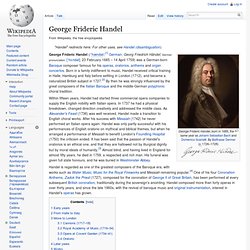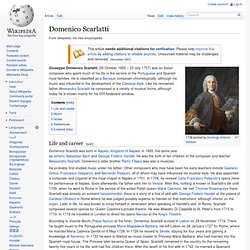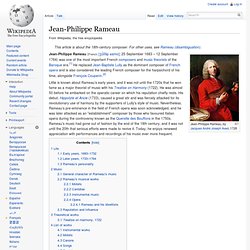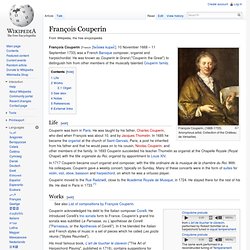

George Frideric Handel. George Frideric Handel (/ˈhændəl/;[1] German: Georg Friedrich Händel; German pronunciation: [ˈhɛndəl]; (1685-02-23)23 February 1685 – 14 April 1759(1759-04-14)) was a German-born Baroque composer famous for his operas, oratorios, anthems and organ concertos.

Born in a family indifferent to music, Handel received critical training in Halle, Hamburg and Italy before settling in London (1712), and became a naturalized British subject in 1727.[2] By then he was strongly influenced by the great composers of the Italian Baroque and the middle-German polyphonic choral tradition. Early years[edit] Händel-Haus (2009) – birthplace of George Frideric Handel Entrance of Teatro del Cocomero in Florence From Halle to Italy[edit] Move to London[edit] In 1712, Handel decided to settle permanently in England. Cannons (1717–18)[edit] Royal Academy of Music (1719–34)[edit] In 1727 Handel was commissioned to write four anthems for the Coronation ceremony of King George II.
The J.S. Bach Home Page. Johann Sebastian Bach. Domenico Scarlatti: a concise biography. Giuseppe Domenico Scarlatti was born in Naples on October 26th, 1685.

The high rank of his godparents is proof of the esteem in which his father, Alessandro Scarlatti, was held as maestro di cappella. Domenico's musical gifts developed with an almost prodigious rapidity. At the age of sixteen he became a musician at the chapel royal, and two years later father and son left Naples and settled in Rome, where Domenico became the pupil of the most eminent musicians in Italy. The originality of Bernardo Pasquini"s inventions and his skill in elaborating them, and Francesco Gasparini's solid science and intense vitality united to form the basis on which Domenico developed his own genius. His association with Corelli (Gasparini being a pupil of Corelli) also contributed to the evolution of his adolescent genius and soon Domenico Scarlatti became famous in his country principally as a harpsichordist.
Attracted by the unknown, Scarlatti abandoned the post of maestro di cappella at St. Visit. Domenico Scarlatti. Life and career[edit] Domenico Scarlatti was born in Naples, Kingdom of Naples, in 1685, the same year as Johann Sebastian Bach and George Frideric Handel.

He was the sixth of ten children of the composer and teacher Alessandro Scarlatti. Domenico's older brother Pietro Filippo was also a musician. According to Vicente Bicchi (Papal Nuncio at the time), Domenico Scarlatti arrived in Lisbon on 29 November 1719. There he taught music to the Portuguese princess Maria Magdalena Barbara.
Scarlatti befriended the castrato singer Farinelli, a fellow Neapolitan also enjoying royal patronage in Madrid. Music[edit] Only a small fraction of Scarlatti's compositions were published during his lifetime; Scarlatti himself seems to have overseen the publication in 1738 of the most famous collection, his 30 Essercizi ("Exercises"). The many sonatas which were unpublished during Scarlatti's lifetime have appeared in print irregularly in the two and a half centuries since. Jean-Philippe Rameau. Jean-Philippe Rameau (French: [ʒɑ̃filip ʁamo]; 25 September 1683 – 12 September 1764) was one of the most important French composers and music theorists of the Baroque era.[1] He replaced Jean-Baptiste Lully as the dominant composer of French opera and is also considered the leading French composer for the harpsichord of his time, alongside François Couperin.[2] Little is known about Rameau's early years, and it was not until the 1720s that he won fame as a major theorist of music with his Treatise on Harmony (1722).

He was almost 50 before he embarked on the operatic career on which his reputation chiefly rests. His debut, Hippolyte et Aricie (1733), caused a great stir and was fiercely attacked for its revolutionary use of harmony by the supporters of Lully's style of music. Life[edit] The details of Rameau's life are generally obscure, especially concerning his first forty years, before he moved to Paris for good.
Early years, 1683–1732[edit] The Cathedral of Saint-Bénigne, Dijon. François Couperin. François Couperin, (1668-1733).

Anonymous artist, Collection of the Château de Versailles. François Couperin (French: [fʁɑ̃swa kupʁɛ̃]; 10 November 1668 – 11 September 1733) was a French Baroque composer, organist and harpsichordist. He was known as Couperin le Grand ("Couperin the Great") to distinguish him from other members of the musically talented Couperin family. Life[edit] Couperin was born in Paris. Couperin moved to the Rue Radziwill, close to the Académie Royale de Musique, in 1724.